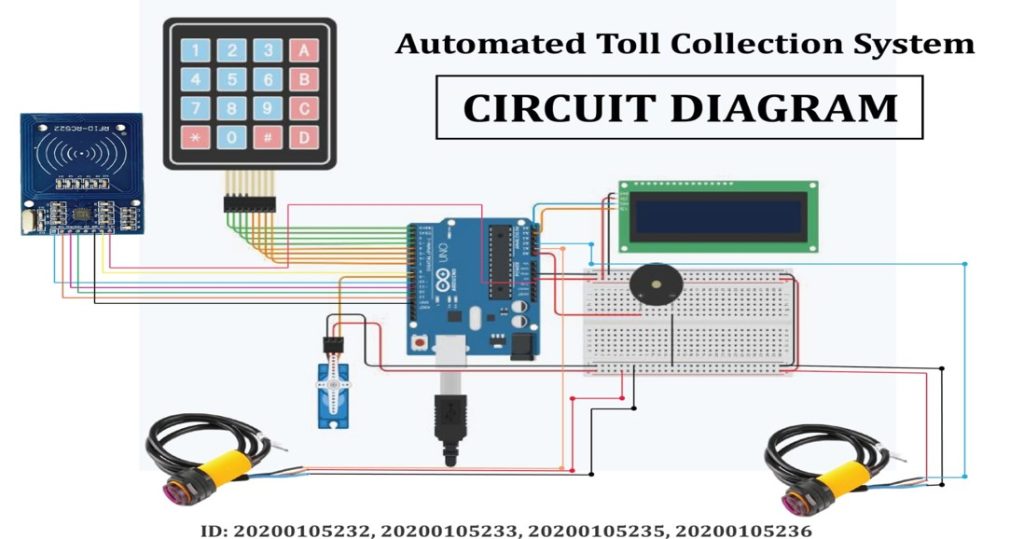RFID-based Automated Toll Booth System using Arduino
The Automated Toll Collection System is a cutting-edge solution designed to streamline toll payment processes, significantly reducing congestion at toll plazas and ensuring a smooth, uninterrupted journey for commuters. Utilizing RFID (Radio Frequency Identification)** technology in conjunction with an Arduino microcontroller, the system automatically identifies vehicles, calculates the appropriate toll fee, and facilitates payment without requiring manual intervention.
Key Features:
– RFID-Based Vehicle Identification: Each vehicle is equipped with an RFID tag that contains unique identification data. As the vehicle approaches the toll booth, the RFID reader extracts this data to identify the vehicle and access the corresponding toll fee information.
– Seamless Toll Payment: The system calculates the toll fee and displays it on an LCD screen for the driver. Payments are processed electronically, ensuring quick and accurate transactions.
– Automated Barrier Control: The system controls a boom barrier that only lifts once the toll fee is successfully paid, enhancing security and ensuring proper toll collection.
– User-Friendly Interface: Drivers can easily recharge their RFID tag balance using a keypad interface, ensuring they are always ready to proceed through tolls without delays.
Merits:
– Time Efficiency: The system significantly reduces wait times at toll plazas, leading to quicker journeys and reduced congestion.
– Accurate Billing: Automated toll calculation reduces the chances of errors, ensuring accurate and dispute-free transactions.
– Enhanced Safety: The elimination of manual toll collection reduces the risk of accidents, making the roadways safer for everyone.
– Cost-Effective: Reduces the need for extensive manpower at toll plazas, cutting down operational costs in the long run.
– Data Collection: The system gathers valuable data on traffic patterns, aiding in better transportation planning and infrastructure development.
Demerits:
– Initial Setup Costs: Implementing such a system requires significant upfront investment in hardware, software, and infrastructure.
– Technical Issues: Like any electronic system, it may face glitches or malfunctions, which could cause delays or inaccurate toll collection.
– Privacy Concerns: The collection of data on vehicles and their movements may raise privacy issues for some users.
– Maintenance Requirements: Regular maintenance is necessary to ensure the RFID readers, barriers, and other components function correctly.
– Limited User Adoption: Drivers unfamiliar with or resistant to new technologies may struggle with adapting to the system, leading to potential issues at toll plazas.
Future Prospects:
The project envisions a future where automatic toll collection is integrated into broader smart city initiatives. Potential advancements include the use of biometric identifiers, cryptocurrency payments, and dynamic pricing models that adapt to real-time traffic conditions. By leveraging emerging technologies, this system could play a crucial role in the development of sustainable and efficient transportation networks worldwide.
The Automated Toll Collection System is a forward-thinking solution that addresses the common challenges faced by traditional toll collection methods. By leveraging RFID technology and Arduino microcontrollers, this system offers a streamlined and efficient approach to toll payment, significantly reducing congestion, enhancing safety, and ensuring accurate billing. While it brings many benefits, including time efficiency and cost savings, it also requires careful consideration of factors like initial setup costs, potential technical issues, and privacy concerns. Looking ahead, the system holds the potential to evolve alongside smart city initiatives, integrating with other advanced technologies to create even more efficient and user-friendly transportation networks. This innovation marks a crucial step toward modernizing infrastructure and improving the overall travel experience for road users.
